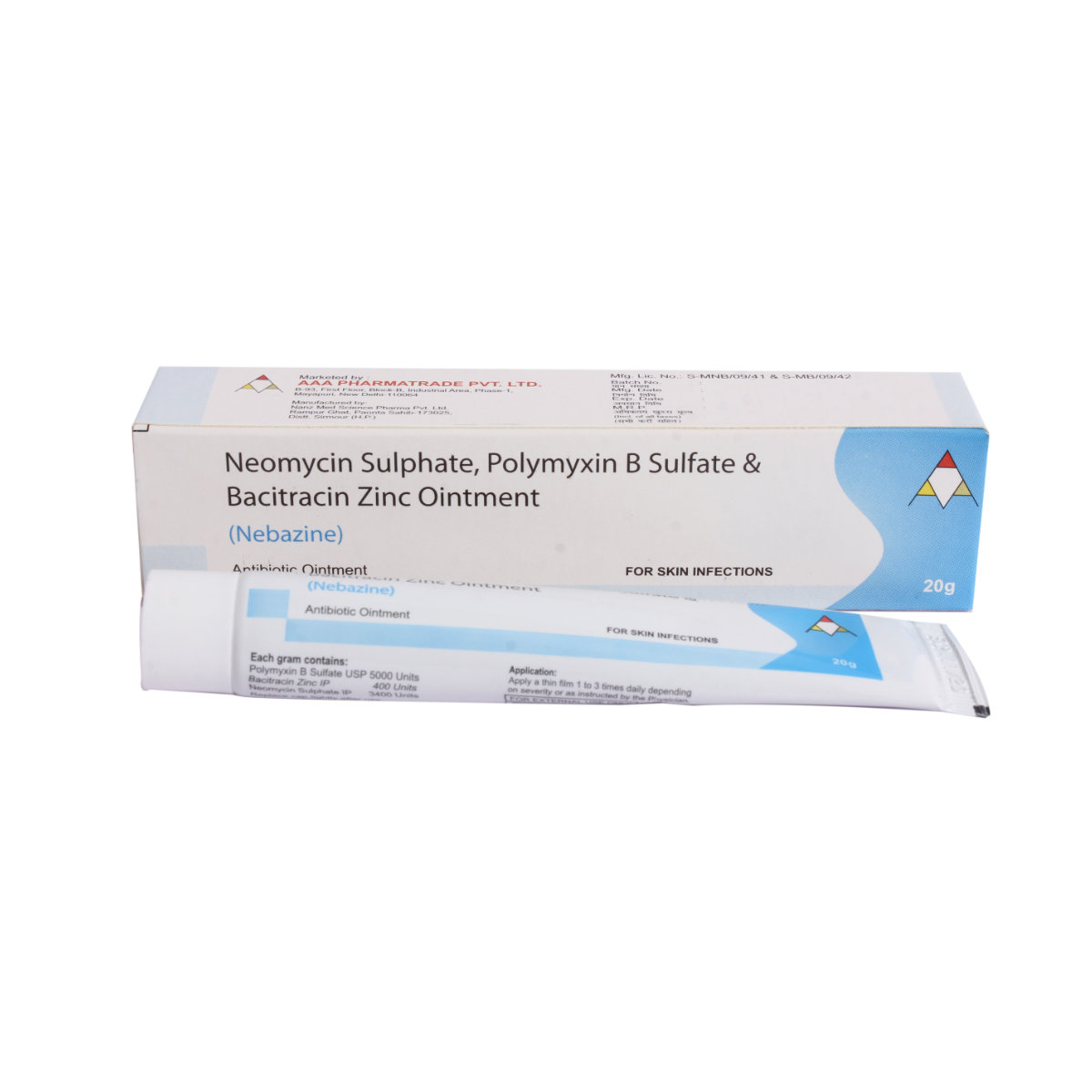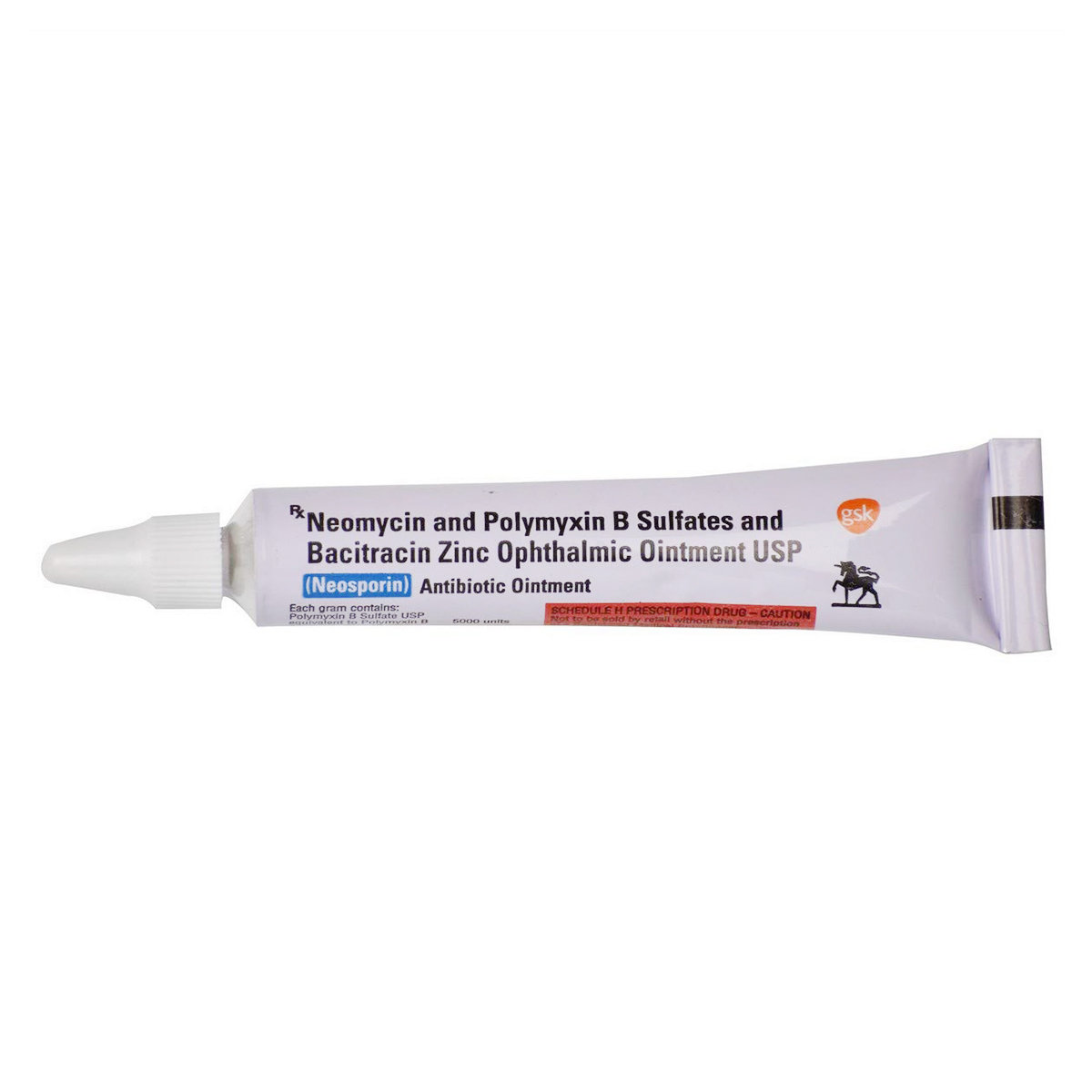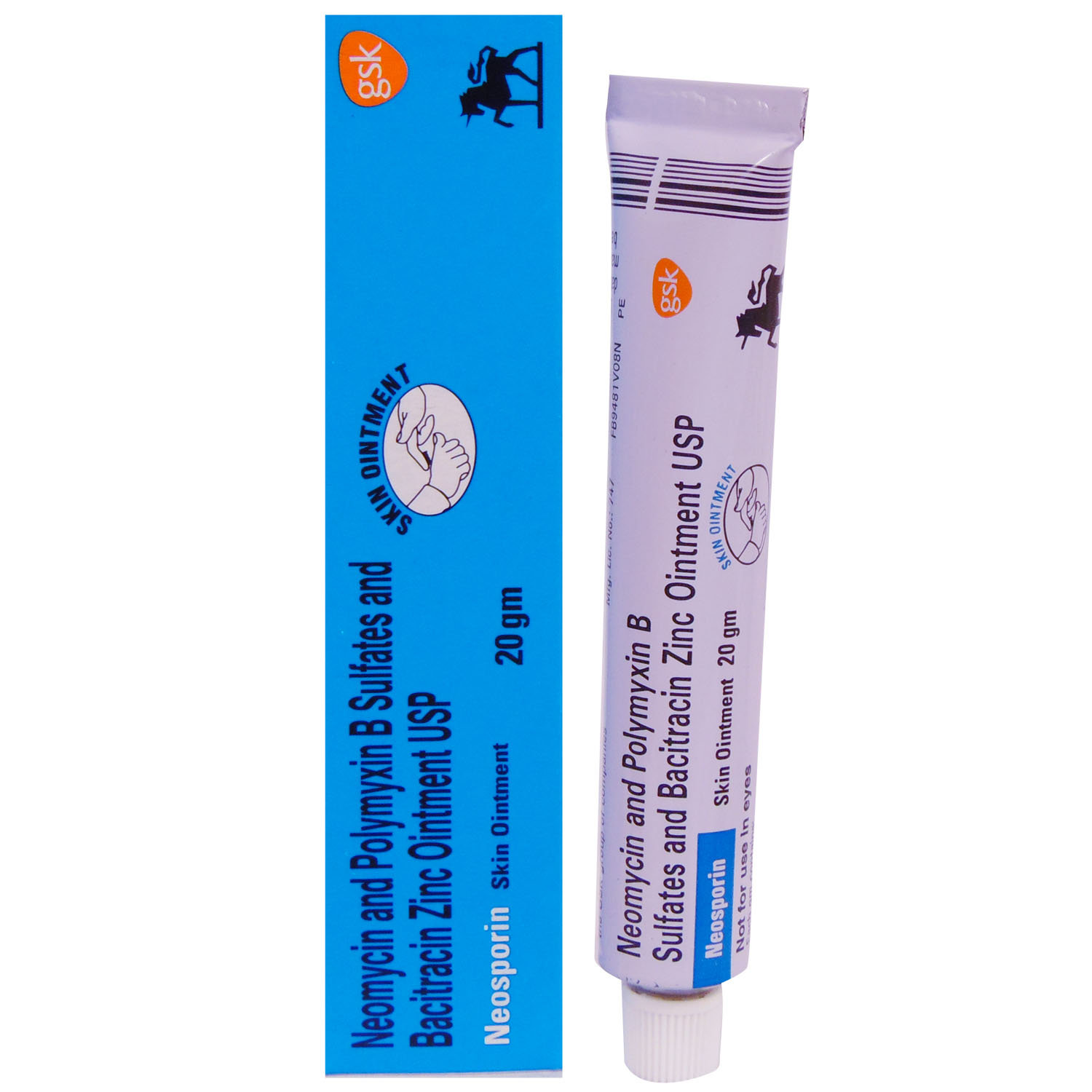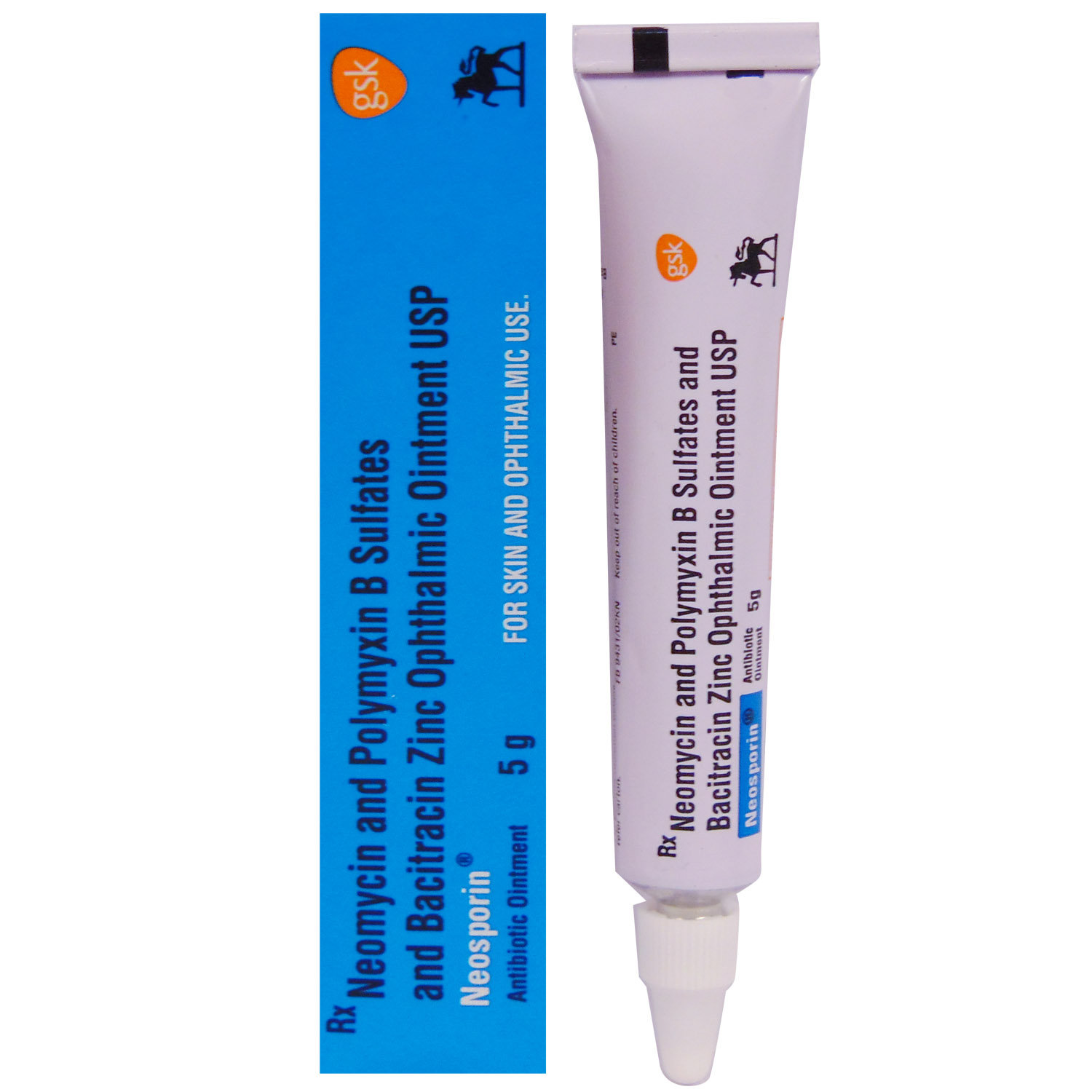- Home
- Neosporin Ointment
Neosporin Ointment Substitute
Neosporin Ointment Substitute
Medicine Composition:
BACITRACIN-400IU + NEOMYCIN-3400IU + POLYMYXIN B-5000IUAll Substitutes & Brand Comparisons
RX
Nebazine Ointment 20gm
AAA Pharma Trade Pvt Ltd
₹111.5
(₹5.02/ 1gm)
58% CHEAPERRX
Out of StockNeosporin Skin Ointment
GlaxoSmithKline Pharmaceuticals Ltd
₹192.5
(₹5.78/ 1gm)
52% CHEAPERRX
Neosporin Skin Ointment 30 gm
GlaxoSmithKline Pharmaceuticals Ltd
₹218
(₹6.54/ 1gm)
46% CHEAPERRX
Out of StockNeosporin Skin Ointment 15 gm
GlaxoSmithKline Pharmaceuticals Ltd
₹119.5
(₹7.17/ 1gm)
41% CHEAPERRX
Out of StockJisporin Ointment
₹45
(₹8.1/ 1gm)
33% CHEAPERRX
Nebaspor Ointment 5 gm
Intas Pharmaceuticals Ltd
₹46
(₹8.28/ 1gm)
32% CHEAPERRX
Neosporin Ointment 5 gm
GlaxoSmithKline Pharmaceuticals Ltd
₹144.5
(₹25.42/ 1gm)
108% COSTLIER

When Should You Consider Switching from Neosporin Ointment?
Patients may explore substitutes in the following scenarios:
- High monthly cost of Neosporin Ointment
- Non-availability in local pharmacies
- Generic recommendation by a doctor
- Side effects or better tolerability with alternatives
What to Know Before Switching
Before you switch from Neosporin Ointment to another medicine, here are some important points to keep in mind:
Same salt, different brands:
Most substitutes contain the same active ingredient - BACITRACIN-400IU + NEOMYCIN-3400IU + POLYMYXIN B-5000IU, but the fillers, coating, or manufacturing quality may vary slightly.
Consult your doctor first:
Even if the salt is the same, your doctor can confirm if the substitute is right for your condition, dosage, and health history.
Watch out for allergies or reactions:
Some people may react differently to certain brands due to inactive ingredients. If you notice any side effects, inform your doctor immediately.
Price ≠ effectiveness:
A lower-priced substitute doesn't mean it's less effective. Many generic medicines work just as well as branded ones.
Check the dosage form and strength:
Always match the substitute’s strength (e.g., 5mg, 10mg) and form (tablet, capsule, syrup) with what your doctor prescribed.
Uses
Neosporin Ointment is used as a first-aid antibiotic to prevent bacterial skin infections due to minor skin injuries. The detailed uses of Neosporin Ointment are as follows:
- Wound Healing: Neosporin Ointment helps heal minor cuts and scrapes by preventing infection and aiding the body's natural recovery process.
- Burn Relief: Neosporin Ointment helps with minor burn relief by reducing infection risk and soothing discomfort.
- Post-Surgical Care: Neosporin Ointment is used in post-surgical care to shield minor incision sites from bacterial infection, supporting a smoother and faster recovery.
- Minor cuts and scrapes: Neosporin Ointment is often used to treat minor cuts and scrapes to help prevent infection and promote healing by killing bacteria, reducing inflammation, and supporting the healing process.
Medicinal Benefits
- Neosporin Ointment is composed of three antibiotic medicines, namely Bacitracin, Neomycin, and Polymyxin B.
- Bacitracin is a bacteriostatic medicine (that stops the growth or reproduction of bacteria). It works by inhibiting bacterial cell wall synthesis.
- Neomycin is an aminoglycoside antibiotic and prevents the synthesis of essential proteins required by bacteria to carry out vital functions.
- Polymyxin B, an antibiotic, destroys the bacterial membrane by binding to the phospholipids on the cell membranes of gram-negative bacteria.
- This process of binding causes the loss of essential metabolites in bacteria. Together, Neosporin Ointment treats bacterial skin infections.
FAQs
The substitutes of Neosporin Ointment contain the same active salt(s) - BACITRACIN-400IU + NEOMYCIN-3400IU + POLYMYXIN B-5000IU. However, they may differ in price, manufacturing quality, and inactive ingredients. Speak to your doctor to find a suitable option.
Switching to a generic substitute medicine in the place of Neosporin Ointment is often possible if it has the same salt, strength, and dosage form. But always check with your doctor before making any changes to your medication.
Generics versions of Neosporin Ointment are typically more affordable because they don’t include the original brand's research, development, and marketing costs. They contain the same active ingredient and are approved for safety and effectiveness.
Most people don’t notice any difference. However, some may react to different fillers or coatings. If you notice any unusual symptoms after switching, consult your doctor.
Make sure the new medicine has the same active salt, strength, dosage form. Always confirm the change with your doctor or pharmacist.
Substitutes of Neosporin Ointment meet the same safety and efficacy standards as Neosporin Ointment, but small differences in absorption or formulation can exist. A doctor can help you choose the right one for your needs.
Yes. Substitutes of Neosporin Ointment may vary in color, size, or shape due to differences in manufacturing and branding, but this does not affect how they work.
Yes, it’s generally safe to switch between multiple substitutes of Neosporin Ointment if they have the same salt and strength. However, always inform your doctor so they can monitor how your body responds.
Yes, many people safely use substitutes of Neosporin Ointment for long-term treatment. Just ensure it’s done under medical supervision.
If your symptoms stay under control or lab results remain stable, the substitute for Neosporin Ointment is likely working well. Regular follow-ups with your doctor are important.
Absolutely. Even with the same salt, small differences can affect how your body responds when switching from Neosporin Ointment to its substitute. Always consult your doctor before switching.
Neosporin Ointment is used as a first-aid antibiotic to prevent bacterial infections in minor cuts, scrapes, or burns on the skin.
Neosporin Ointment consists of antibiotic medications, namely: Bacitracin, Neomycin and Polymyxin B. It inhibits bacterial growth by causing damage to its cell wall and prevents the synthesis of essential proteins required by bacteria to carry out their vital functions.
Neosporin Ointment is not recommended for use in fungal or viral skin infections. It is effective only against bacterial skin infections and minor skin infections caused by small cuts, scrapes, or burns.
Neosporin Ointment is not recommended for use on deep cuts, puncture wounds, animal bites, and serious burns.
Your doctor will decide the dose and duration of Neosporin Ointment based on the severity of your infection. It is advised to use Neosporin Ointment only for the prescribed period since long-term usage may cause weakening and thinning of the skin.
Please do not stop using Neosporin Ointment on your own even if the symptoms are relieved. Your symptoms may improve before the skin infection is completely cured. Continue using Neosporin Ointment until the course advised by the doctor is finished.
Avoid using Neosporin Ointment on deep wounds like punctures, burns, cuts, or animal bites. If you have allergies, skin infections, ear problems, or any underlying conditions or are pregnant or breastfeeding, consult your doctor before applying. Always follow the prescribed dosage and duration of treatment.
No. Using a higher dose than recommended may increase the risk of side effects without providing additional benefits. Always follow the prescribed dosage.
Store the Neosporin Ointment at room temperature, away from heat and direct sunlight. Once the tube is empty, dispose of it responsibly according to local waste management guidelines. This typically involves discarding it in a household waste container or taking it to a designated hazardous waste collection point.
Always follow the specific instructions given by your doctor or the directions printed on the product label. The frequency of application may change depending on the severity of your infection.
Yes, it's safe to use for children. However, always consult your paediatrician for specific dosage instructions and to ensure they are appropriate for your child's age and condition.
No, Neosporin Ointment is not intended to treat sunburn. Sunburns require cooling and hydration. Consult a doctor if you have severe sunburn.
Buy best Dermatology products by
Glenmark Pharmaceuticals Ltd
Canixa Life Sciences Pvt Ltd
Klm Laboratories Pvt Ltd
Sun Pharmaceutical Industries Ltd
Cipla Ltd
Intas Pharmaceuticals Ltd
Ajanta Pharma Ltd
East West Pharma India Pvt Ltd
Dr Reddy's Laboratories Ltd
Abbott India Ltd
Brinton Pharmaceuticals Ltd
Skinocean Pharmaceuticals
Leeford Healthcare Ltd
Amwill Healthcare Pvt Ltd
Alkem Laboratories Ltd
Atopic laboratories Pvt Ltd
Hegde & Hegde Pharmaceutica Llp
Torrent Pharmaceuticals Ltd
Palsons Derma Pvt Ltd
Dermacia Healthcare
Oaknet Healthcare Pvt Ltd
Yaher Pharma
Ipca Laboratories Ltd
Med Manor Organics Pvt Ltd
Micro Labs Ltd
Dermocare Laboratories Gujarat Llp
Talent India Pvt Ltd
Apex Laboratories Pvt Ltd
Mankind Pharma Pvt Ltd
Kivi Labs Ltd
Nemus Pharmaceuticals Pvt Ltd
Systopic Laboratories Pvt Ltd
Menarini India Pvt Ltd
Regaliz Medicare Ltd
Ethinext Pharma
Zydus Cadila
Inex Medicaments Pvt Ltd
Mohrish Pharmaceuticals Pvt Ltd
Lupin Ltd
Newtrimed Healthcare Pvt Ltd
Hbc Dermiza Healthcare Pvt Ltd
Mrhm Pharma Pvt Ltd
Praise Pharma
Zydus Healthcare Ltd
Eskon Pharma
GlaxoSmithKline Pharmaceuticals Ltd
La Pristine Bioceuticals Pvt Ltd
Wallace Pharmaceuticals Pvt Ltd
Glowderma Lab Pvt Ltd
Biocute Life Care
Sol Derma Pharmaceuticals Pvt Ltd
Macleods Pharmaceuticals Ltd
Aurel Biolife
Ethicare Remedies Pvt Ltd
Galcare Pharmaceuticals Pvt Ltd
Percos India Pvt Ltd
Rockmed Pharma Pvt Ltd
Kaizen Drugs Pvt Ltd
Connote Healthcare
Elder Pharmaceuticals Ltd
Rely On Pharmaceuticals
Zee Laboratories Ltd
Karlin Pharmaceuticals & Exports Pvt Ltd
Yap Bioceuticals
Wockhardt Ltd
Alniche Life Sciences Pvt Ltd
Gary Pharmaceuticals Pvt Ltd
La Med Healthcare Pvt Ltd
Prism Life Sciences Ltd
Rhine Biogenics Pvt Ltd
Akumentis Healthcare Ltd
Apple Therapeutics Pvt Ltd
Leogard Pharmaceuticals Pvt Ltd
Lyra Laboratories Pvt Ltd
P and P Dermaceuticals Pvt Ltd
Adonis Laboratories Pvt Ltd
Arka Vital Science Pvt Ltd
Eumedica Pharamceuticals
Indiabulls Pharmaceuticals Pvt Ltd
Albatross Healthcare Pvt Ltd
Yash Pharma Laboratories Pvt Ltd
Capital Pharma
Dermajoint India
Dermarex HealthCare India Pvt Ltd
Iceberg Health Care Pvt Ltd
Glasier Wellness Inc
Grace Derma Healthcare Pvt Ltd
Oziel Pharmaceuticals Pvt Ltd
Bioswizz Pharmaceuticals Ltd
FDC Ltd
Medcure Organics Pvt Ltd
Salve Pharmaceuticals Pvt Ltd
West Coast Pharmaceuticals Pvt Ltd
Entod Pharmaceuticals Ltd
Jenburkt Pharmaceuticals Ltd
Olcare Laboratories Pvt Ltd
Anhox Healthcare Pvt Ltd
Biochemix Health Care Pvt Ltd
Indchemie Health Specialities Pvt Ltd
Indolands Pharma Pvt Ltd
BODY CREAM
Body Lotion
Soap
Face Cream
Shampoo
Sun Screen
Face Gel
Face Wash
HAIR SOLUTION
BODY GEL
Face Serum
Hair Serum
Hair Lotion
Dusting Powder
ANTISEPTIC
Body Wash
Face Lotion
FACE CLEANSER
Body Spray
Foot Cream
Conditioner
Eye Cream
Eye Gel
Cleanser
Hair Cream
Hair Gel
Hair Spray
FUNGAL INFECTION
Hair Oil
Sanitizer
Specialty Supplements
Face Mask
Skin Ointment
Lip Balm
Capsule
Eye Serum
Intimate Wash
Hand Cream
Facial Spray
Face Toner
Hair Mask
Hand Wash
SPECIALITY SUPPLEMENT
Tablet
BABY SUNSCREEN
Body Butter
Body Scrub
EYE SOLUTION
FACIAL WIPE
Gargle
Hair Color
Hair Tonic
Intimate Spray
Lip Serum
VITAMIN D






